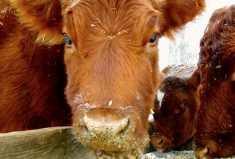An AgriRecovery plan announced Friday is set to pay eligible Alberta farmers 95 cents per day per market-ready hog toward the animals’ upkeep during the shutdown of the province’s biggest hog slaughter plant.
Olymel, the meat packing arm of Sollio Co-operative, reopened its plant at Red Deer this week after announcing Feb. 15 it would temporarily close the facility due to a major COVID-19 outbreak among plant staff.
According to local media, over 510 cases of COVID-19 are believed to be connected to the Olymel outbreak, including over 90 currently-active cases, along with the deaths of three plant workers and one other person. The provincial opposition New Democrats said Thursday three plant employees “are currently fighting for their lives in intensive care.”
Read Also

U.S. grains: Soy futures post biggest monthly gain in nearly five years on China trade optimism
U.S. soybean futures climbed to a 15-month high and posted their biggest monthly gain in nearly five years on Friday following a rally fueled by the prospect of revived exports to China.
Officials with Alberta Pork this week estimated the total slaughter backlog stemming from the shutdown at more than 100,000 hogs.
The new set-aside plan, to be cost-shared 60-40 between the federal and Alberta governments at a total budget of $4 million, is to support producers who had hogs booked for processing at Olymel in Red Deer between Feb. 8 and March 31 and held them back from shipping.
At the end of the program, eligible participants are to get payments based on the number of days eligible animals were fed within the scope of the initiative, up to a maximum of 23 days.
Applications are “tentatively” expected to be available March 12 through the province’s Agriculture Financial Services Corp. (AFSC) and the program is expected to remain open until March 25.
For program purposes, “the first seven days of delayed marketing is not considered extraordinary, and is often a normal course of business for producers,” AFSC said.
There will be two components to the program: maintenance feed costs, and destruction and disposal costs. “We are currently focused on the maintenance component of the program, and will address emerging needs over the next month as the situation unfolds,” AFSC said.
That is, if slaughter capacity “continues to be an issue” and a producer can’t wait any longer to market animals, the second component would then compensate for “extraordinary costs associated with the humane slaughter and disposal of non-marketable hogs.”
“The AgriRecovery program is designed to help producers in emergency situations, and the shutdown of the Olymel plant certainly constitutes an emergency for Alberta hog farmers,” Alberta Pork chair Brent Moen said Friday in a release.
Many Alberta hog farmers ship to Red Deer weekly basis, the hog farmers’ agency said, and the shutdown left them carrying out contingency plans and “alternative solutions” for marketing.
Those alternatives “have created unexpected financial burdens for producers, especially related to additional feed costs and marketing charges over-and-above normal expenses,” Alberta Pork said, putting costs per producer anywhere between “a few thousand dollars (and) tens of thousands of dollars.”
The hogs covered under the set-aside must have been scheduled for slaughter at the Olymel plant at Red Deer between Feb. 8 and March 31, must be fed in Alberta and must have been delayed from shipping specifically due to the COVID-19-related plant shutdown.
Only market-ready hogs are covered, AFSC said Friday. That excludes boars, sows and any hogs not considered market-ready.
Set-aside participants will only need to provide one application per producer for the duration of the program, AFSC said. To be eligible, a producer must be an Alberta resident and either a Canadian citizen or permanent resident at least 18 years of age, or be a corporation actively operating in Alberta.
The producer also must have an Alberta Pork producer number and be responsible for paying the feeding costs of the eligible animals located in Alberta.
An eligible producer must report farm income and expenses in Alberta for income tax purposes, AFSC said. If not required to file farm income tax, an applicant must provide documentation showing production and sale of ag commodities.
“Alberta’s government is committed to protecting lives and livelihoods. We want to make sure that hog producers are getting the supports that they need so that they can continue to do what they do best, which is producing safe, high-quality food, not just for Alberta families but for families all around the world,” provincial Agriculture Minister Devin Dreeshen said in a statement Friday.
Meanwhile, Alberta’s NDP on Thursday called for an “immediate” public inquiry into the COVID-19 outbreak at the Red Deer plant, and for a pledge from the provincial justice ministry that it won’t bring in legislation to “protect potentially negligent corporations from lawsuits launched by victims’ families.”
“People with no choice but to continue working in unsafe conditions have gotten sick and died,” NDP leader Rachel Notley said in a release. “We need to hold those responsible accountable and develop new practices to prevent tragedies like this in the future.”
Federal Ag Minister Marie-Claude Bibeau, in announcing the hog set-aside program on Friday, said the government “also care(s) deeply about the health and safety of food production plant workers, who are doing essential work, and we have implemented a range of emergency safety and worker benefit programs to support their safety and wellbeing.” — Glacier FarmMedia Network












